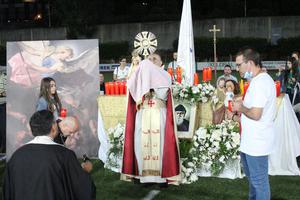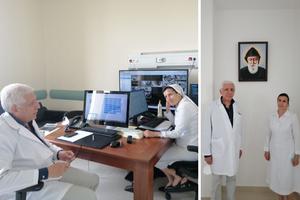Violin Gives Hope to Syrian Christian Refugee Amid Uncertainty
Music provides displaced family with welcome respite from uncertain times.

BEIRUT — Aboud Kaplo and his two brothers wish they could go to school.
But living a life of uncertainty as Syrian refugees in Lebanon, their education is on hold as another school year unfolds.
“As parents, that’s the worst part,” their mother, Hanane Kaplo, told the Register, her eyes brimming with tears. She and her husband, Emanuel, never expected that their sons’ education would be interrupted.
The Syriac Orthodox family from war-torn Aleppo, Syria, came to Lebanon in October 2016 for what they hoped would be a temporary stay; they thought they would be approved quickly for emigration.
Neither parent has found work, so they can’t afford to send their three sons to school, as approximately 70% of the schools in Lebanon are private. And the public school is too far away from their lodging and would require having a car.
Before the conflict broke out in Syria, the Kaplo family lived a middle-class life in Aleppo. Emanuel had a managerial position at the municipality, and Hanane worked in a bank. But as the violence in Aleppo continued to escalate, they feared for their lives.
“We couldn’t tolerate the bombs going off anymore,” Hanane said. The last straw was when the children’s school got bombed. Fortunately, the attack did not occur during school hours.
At the end of 2012, the Kaplos fled to Qamishli in northeastern Syria, where Hanane is from. They stayed in the summer house of one of her brothers, who lives in Europe.
In Qamishli, the boys attended a Syriac Church school and joined a Boy Scout group. When the troop recruited for its 60-piece orchestra, Aboud and his brother George signed up. That’s where Aboud discovered the violin. He took some lessons, learned quickly, and realized he loved playing.
But the situation in Qamishli also deteriorated.
“It was good for the first two years, but then the violence became door-to-door,” Emanuel explained. “We tried to stay as long as possible,” he said, but after living there for four years, they came to Lebanon with the hopes of immigrating to Australia, where some relatives live.
Now the family of five is living in two dormitory-style small rooms at the St. Gabriel Syriac (Orthodox) Center beside the church, also named St. Gabriel, in Aljjatoon, Lebanon. The center, dedicated in 2011, was intended as a venue for conferences.
After the Syrian conflict erupted, however, it soon became a place of refuge for Syriac Orthodox who fled the war. The center has also been hosting Syriac Orthodox from Iraq who were among the 100,000 Christians evicted from their ancestral lands when the Islamic State invaded the Ninevah Plain in the summer of 2014. All the families have applied to immigrate to Western countries. Over the years, some have been accepted by those countries.
Life for the Kaplo family is one of waiting, of day-in-day-out having nothing to do.
They applied to be resettled in Australia. After waiting nearly two months for an interview, they were rejected after another two months. They have since reapplied and are awaiting a decision.
“Our whole life has been turned upside down. We feel very lost,” Hanane said.
But Aboud takes solace in playing the violin.
His beginner’s instrument was one of the few possessions he could bring when he left Syria in October 2016. The family took a flight from Qamishli to Damascus, then came by taxi to Lebanon, so baggage allowance was minimal. With no school and no set routine amid the monotonous life as a refugee, Aboud continued practicing the violin every day.
When a filmmaker, Susie Attwood, visited the center for a documentary on refugees, she was impressed with Aboud’s talent and dedication. As an accomplished violinist and alumnus of the Faculty of Music at Oxford, in England, she also recognized the limitations of his instrument.
Unbeknownst to the Kaplo family, Attwood had set out to make a huge difference in Aboud’s musical capabilities. The Kaplos were later visited by a translator from the documentary team who had some surprises for the family, including greeting cards from Attwood. And for Aboud, there was a prized violin on loan from the renowned Bate Collection of Musical Instruments at the Faculty of Music at Oxford.
“I was overjoyed. I couldn’t believe it, that it was happening,” Aboud told the Register. He said the difference between his old violin and the Bate instrument “is amazing.”
The Bate Collection holds more than 2,000 instruments that date from medieval to modern times.
Andrew Lamb, manager of the Bate Collection, in the accompanying letter to Aboud, wrote, “We have heard how enthusiastic you are to learn to play the violin. It is with great pleasure that the Bate Collection, as part of the Faculty of Music, has found an instrument that you can borrow on a long-term basis to help you in your learning. It is a good instrument, and you should find it better than the one you are currently using.
“We understand your circumstances may change at any time and hope that this instrument will be able to travel with you and be of use until you need a better one. At that time, we will try to find another instrument for you. We wish you all the very best for your future and hope to hear from you about your progress.”
The violin sent to Aboud is a 19th-century instrument made in Germany by Wolff Brothers and once belonged to a former curator of the collection.
Aboud’s dream is to attend a school of music in Australia. Meanwhile, the violin “has given me some hope, to study and practice more,” the aspiring musician said. Every day, he practices for one and a half to two hours. His repertoire ranges from classical to popular songs. He especially likes to play the hit song Despacito.
But Aboud also realizes the importance of education. He was a top student in school and especially enjoyed physics, chemistry and math. His 13-year-old brother George is a voracious reader who is drawn to history. And 10-year-old Ram likes math.
And there are so many children and families like theirs.
According to Archbishop Theophilus George Saliba, the Syriac Orthodox archbishop of Mount Lebanon, there are about 1,000 Syriac Orthodox families who are refugees from Syria in Lebanon.
“No family is planning to go back to Syria,” he told the Register. “Maybe if the situation were better, some would consider to return. But at the present, no.”
“We need their presence in the Middle East,” the archbishop said of the Syriac Orthodox from Syria as well as from Iraq. “We don’t want them to leave. But their decision to seek to emigrate comes from their hearts, their souls, their minds,” he emphasized.
“This is a very hard, uncertain future for our people, our community in the Middle East in general. It is a very dark future,” the archbishop said.
“I just want to give my children a better future,” Emanuel Kaplo said. “I’m willing to do any kind of work to begin a new life.”
Doreen Abi Raad writes from Beirut, Lebanon.

















